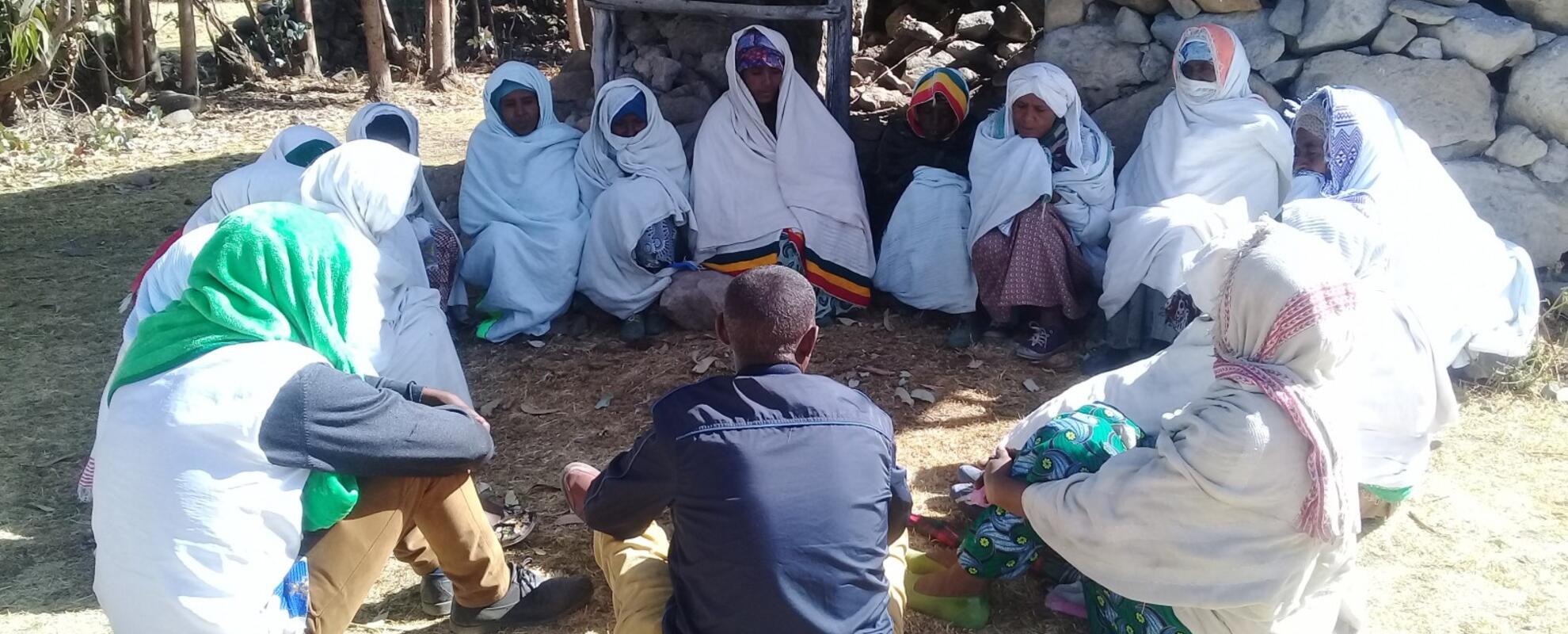
Community conversations contribute to transform gender relations in rural Ethiopia
Since 2018, researchers from the International Livestock Research Institute (ILRI) and the International Center for Agricultural Research in the Dry Areas (ICARDA) and development partners have been testing a gender transformative, community-based learning approach known as ‘community conversation’ in animal health management in four research sites (Yabello, Doyogena, Menz and Bonga) in Ethiopia.
The work, under the CGIAR Research Program on Livestock, has aimed to use the approach to engage community members and local partners in dialogues and joint actions on gender in livestock development. The community conversations have addressed various topics such as gender and zoonosis, animal welfare, antimicrobial resistance, gastrointestinal parasite control, animal feed management and collective livestock marketing. Central to the conversations has been exploring perceptions and knowledge of men and women about key livestock management issues such as animal diseases.
Using separate groups of females and males and combined gender groups, the researchers have asked community members questions such as ‘Who in your household is more knowledgeable about animal diseases?’, ‘Who has more access to animal health information?’, ‘Who makes better decisions on how to treat animals?’, ‘Who takes better care for animals?’, ‘Who calls the veterinary officer when an animal is sick?’. These questions have yielded valuable insights and evidence that has helped challenge the perceptions of gendered knowledge differences in local communities.
In all the sites, before the conversations, the team tested the discussion topics with a group of 20 women and men community members to get their initial views of the topic of discussion and to make sure they could understand the topic and questions before the community conversation sessions. For example, the men and women who were interviewed before the session on animal health management said that women report clinical signs of animal diseases to men, who know the diseases better. The men then contact the local veterinary officers to schedule treatment, and make payments to the treatments
Using this feedback, the researchers decided to use mixed gender and separate men and women groups to better tease out the gendered perceptions and knowledge about women’s role and knowledge of animal diseases and their management. Using the approach, the researchers were able to observe and discuss with the community members issues such as women not speaking up in mixed gender community conversation groups even when they were given chances to speak. The conversations revealed that, for the most part, women lack confidence to express their ideas and knowledge and their interactions in group events seem to be influenced by social comparisons. In mixed groups, women often compare themselves with men and tend to be influenced by culturally defined social expectations. Women were better able to express themselves in women only groups where the cultural expectations were less felt.
Sharing the results of both women and men groups in plenary demonstrated that women in many cases just were as knowledgeable as men on the different conversation topics including animal disease management. It was very revealing to both men and women to hear the results of each gender’s group. The use of the approach has helped men realize that women are more knowledgeable about livestock diseases and other livestock-related matters than men assume, and this realization has led to questioning of assumptions about gendered knowledge differences in the participating communities.
Men now understand that just because women rarely speak up in mixed gender groups does not mean ‘they do not know.’ As the main caretakers of livestock, women have rich knowledge on livestock management, they just need to be empowered to share their knowledge and express themselves in public fora. ‘As they are the main caretakers of livestock, women know which feed types are good for which animals and production purpose,’ said a male participant. ‘Despite this, men usually make decisions on feed allocation and give instructions to their wives on how to feed animals,’ he said, and calls for his fellow men to recognize women’s knowledge and act collaboratively.
These findings suggest that gender biases may be limiting service delivery and knowledge sharing both at the livestock extension service delivery and community levels. Gender transformative approaches such as community conversations can support efforts to achieve both gender equality and sectoral development outcomes. Due to the conversations, male community members in all the sites have expressed commitment to support their wives to have access to more livestock management-related information. Women community members have also emphasized the need for support from their husbands in enabling and strengthening their participation in community meetings





